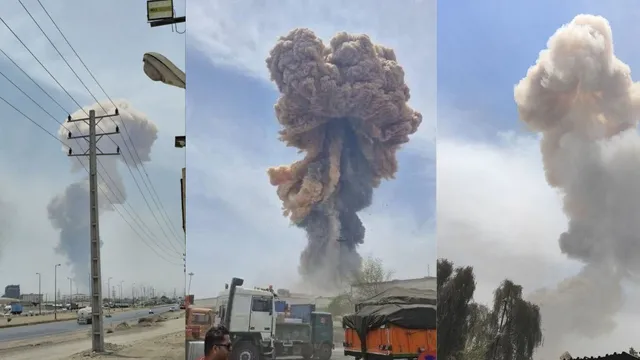- By Shivangi Sharma
- Sun, 27 Apr 2025 09:21 PM (IST)
- Source:JND
A devastating explosion at Iran’s Shahid Rajaee port in Bandar Abbas has left at least 28 people dead and over 1,000 injured, according to Iranian authorities. The blast, which sent a towering plume of fire and smoke into the sky, could reportedly be felt up to 31 miles away. Video footage shared by the BBC captured the massive fiery eruption, highlighting the sheer magnitude of the disaster.
While the exact cause of the explosion is still under investigation, early reports suggest that improperly stored chemicals may have triggered the blast. Iranian President Masoud Pezeshkian, who visited the site and met with victims, described the incident as an "accident." State media outlet IRNA also mentioned "recklessness in storing flammable material" as a possible factor.
The Customs Administration of Iran blamed a “stockpile of hazardous goods and chemical materials stored in the port area” for the explosion. Officials have stressed that there is no evidence linking the explosion to terrorism, military action, or Iran’s defence sector.
Link To Missile Fuel Shipment From China
Adding another layer to the mystery, a source connected to Iran’s Islamic Revolutionary Guard Corps (IRGC) told The New York Times that the explosion involved sodium perchlorate, a chemical widely used in solid missile fuel. According to private security firm Ambrey, Bandar Abbas port had received a shipment of this chemical from China in March 2025.
Despite the dangers associated with sodium perchlorate, it appears that the cargo remained stored at the port for months—a risky move, especially after global awareness heightened following the tragic Beirut port blast in 2020, which killed over 200 people.
ALSO READ:'We Will Die of Hunger': Pakistan Turning Into Desert Without Indus Water? Here’s Shocking Reality
Iranian Government Response
President Pezeshkian’s visit to the port underscores the seriousness with which the Iranian government is treating the incident. State officials continue to deny the presence of military materials at the port, likely to avoid international scrutiny amid growing regional tensions.
Meanwhile, Ebrahim Rezaei, spokesman for Iran’s national security and foreign policy committee, posted on X (formerly Twitter) that initial reports indicated the explosion had “nothing to do with Iran’s defence sector.”
Echoes Of Beirut?
The incident draws uncomfortable comparisons to the 2020 Beirut explosion, where improperly stored ammonium nitrate devastated large parts of the Lebanese capital. Experts are questioning why Iranian authorities failed to move the hazardous shipment, despite the well-known risks.

